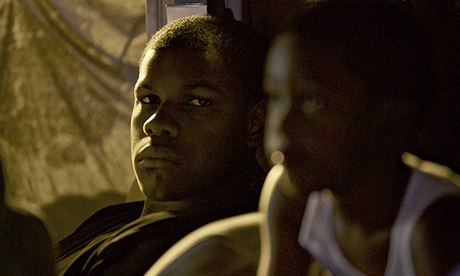
The world is full of people taking the easy way out. Bambi Jones (John Boyega) isn't one of them. Raised as a Watts gangster by his Uncle Shrimp ("the weaker the name, the harder the man"), the 21-year-old has been to prison and back. On his return It would be easiest to grab a gun and fall in with uncle. Instead Bambi - an aspiring writer with a story published in McSweeney's while in prison - decides to pick up his young son, leave his troubled family and set off down the straight, hard road to redemption.
Imperial Dreams, developed at the 2011 Sundance Screenwriters Lab by first-time writer-director Malik Vitthal, tries to skirt cliché by having its tortured gangster reject that one last job. It's a brave narrative choice, but it leaves Vitthal's film flailing for interest. Bambi (played with a toned precision by Attack the Block's Boyega) is an earnest and sombre young man. Prison has left him with a weight of responsibility. No-one feels that more keenly than the audience. There is little light in Bambi's forest and not enough depth to make the darkness meaningful. Bambi's mum's a drug mess, his cousin's a drunk who's fallen foul of a local gang. Both of their stories lack verve and unwind with a deadening predictability.
Vitthal takes his cues from David Ayer in showing us the economically rotten side of LA. His vision of Watts is impressive - an ethereal nightmare of chain-link fences, barking dogs and wailing sirens. Bambi wanders the streets looking for an out, sleeping in his car and reading bedtime stories to his son from his own writing. He's resolved to work in a system that works against him. So a visit to the DMV descends into a maddening Catch-22: he can't get a job because he can't get a driver's licence. He can't get a driver's licence because he owes child support, which he can't pay, because he hasn't got a job. Bureaucracy stifles the chances of getting ahead for anyone trying to go straight. It's an important point, but it's delivered with such mirthless conviction that you're left hoping one of Ayer's shades-and-backchat anti-heroes will charge into the mix. Ayer takes pleasure in letting the compromised wipe their feet on the rule book, Vitthal has Bambi take his shoes off at the door.
Fruitvale Station, to which Imperial Dreams bears some similarity, made a play of showing how heavily the odds are stacked against young black men attempting to live a straight life. Both films preach a righteous message: that the individual's willingness to live by the law has to be met by a state ready to look out for it's most vulnerable. But, whereas Fruitvale felt naturalistic, Imperial Dreams - for all it's good intentions - makes watching its reality a grind. Vitthal's film is full of heart, but overly ambitious. He could have made it easy on himself and steered us down a much more familiar route. Instead he delivers a moralistic story that's pure in its intention and a real slog to watch.
• More from the Sundance film festival

